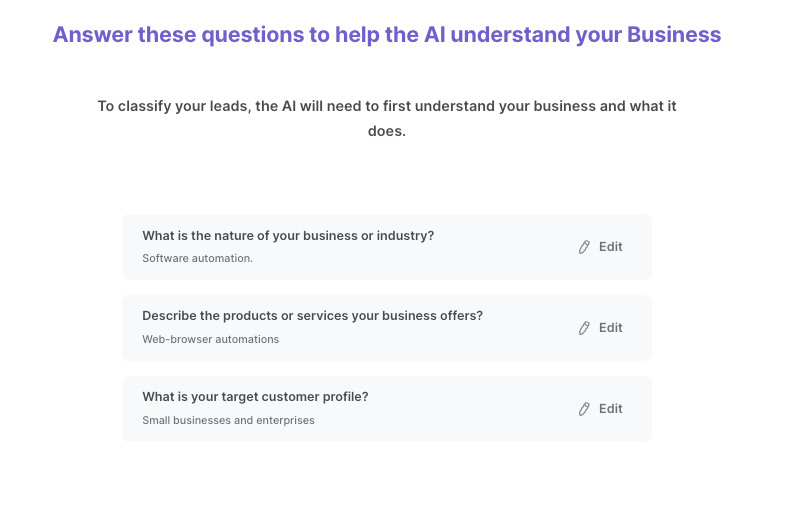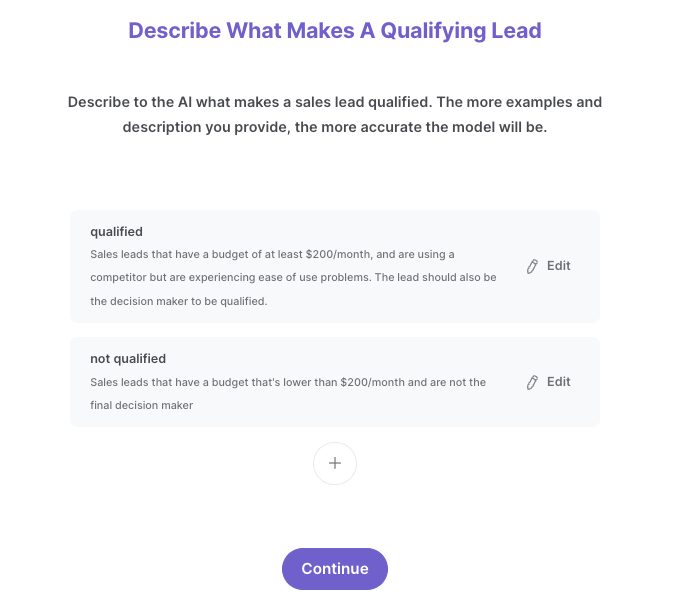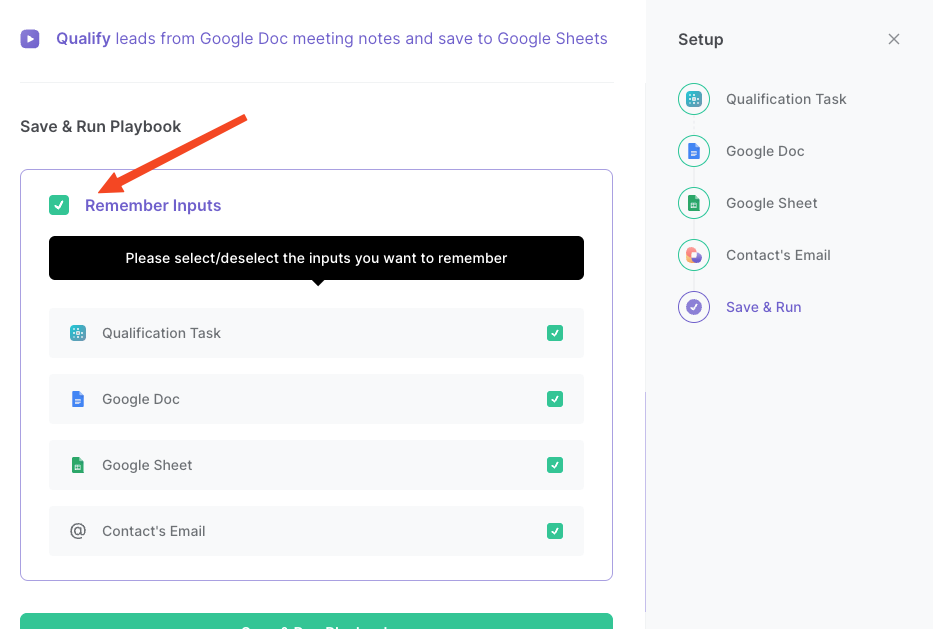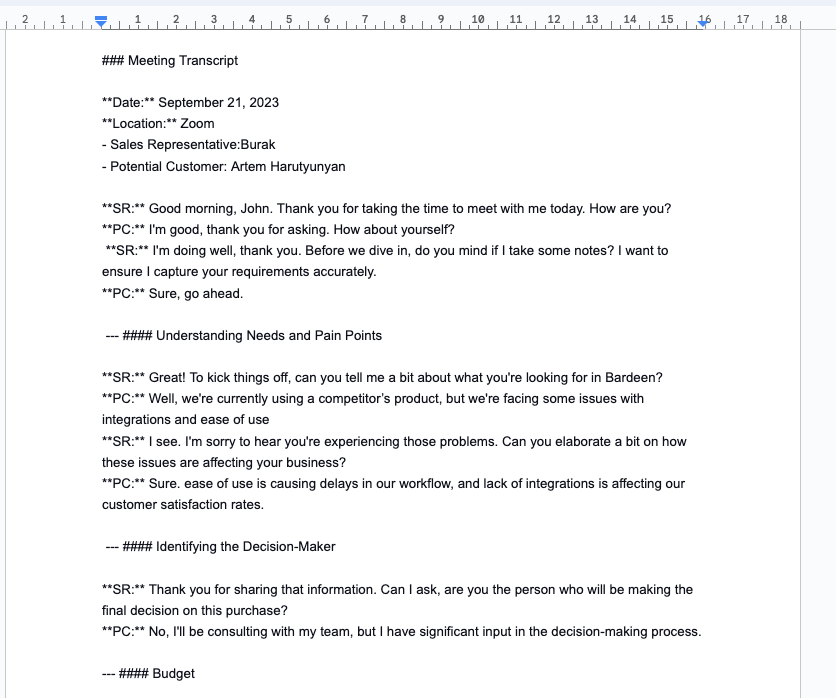Qualify leads from Google Doc meeting notes and save to Google Sheets
This is a Bardeen playbook. It's a pre-built automation template you can run in one-click to perform a repetitive task. Get started with our free Chrome extension.
Explore other automations
This playbook has been deprecated.
Explore Bardeen's playbook catalog for other automations or build your own.

How does this automation work?
Streamline your lead qualification process with Bardeen by analyzing Google Doc meeting notes, enriching contact information with Clearbit, and saving the data to Google Sheets. This playbook is designed for sales teams looking to automate the process of identifying high-quality leads from meeting summaries. By automating the enrichment and qualification process, sales representatives can focus on engaging with prospects and closing deals.
Here's a step-by-step guide to qualify leads from your meeting notes:
- Step 1: Extract text from Google Docs - Bardeen retrieves the content of your meeting notes from a specified Google Doc. This is where your lead information begins to be processed.
- Step 2: Enrich with Clearbit - Using Clearbit, Bardeen enriches the email addresses found in your notes to gather additional information such as social media profiles, demographics, and firmographics.
- Step 3: Classify with Bardeen AI - Bardeen's AI Actions analyze the text to classify and qualify the leads based on your predefined criteria. This helps you prioritize leads that are more likely to convert.
- Step 4: Update Google Sheets - Finally, the qualified lead data is appended to a Google Sheet, updating your sales database with enriched and classified contact information.
How to run the playbook
Looking to streamline your workflow and make the most of your meeting notes in Google Docs? Imagine effortlessly refining your contacts' information with email addresses and enriching them with valuable data from Clearbit, seamlessly updating your records. In today's fast-paced work environment, staying organized and ensuring every meeting counts is a constant challenge.
No more tedious manual data entry or sifting through emails. With our playbook, your notes become actionable insights.
Whether you're managing sales leads, networking, or tracking client interactions, our automation streamlines the process, allowing you to focus on what truly matters – meaningful connections and fruitful outcomes. This not only saves you time but also ensures you're always working with the most up-to-date and qualified information.
Let’s set it up!
Step 1: Pin the playbook and integrate Google Docs
First, click the “Pin it” button at the top of this page to save this automation. You will be redirected to install the browser extension when you run it for the first time. Bardeen will also prompt you to integrate Google Docs.
Activate Bardeen (or hit Option + B on Mac or ALT + B on PC on your keyboard) and click on the playbook card. The setup flow will start. Bardeen will ask you to customize your sales qualification task. Once you click this option, the qualification flow will start. Bardeen will ask you questions about your business.

It will then ask you to describe your qualification criteria. It’s important to give clear details here, as this prompt will be the main way Bardeen will qualify your leads. For the example below, I described clearly the criteria for my qualification based on the meeting notes. I also named the categories.

Once this step is completed, Bardeen will ask you to train the model.

This step is optional. However, we recommend that you complete this step as it will increase the quality of your results.
After your qualification is entered, complete the setup by specifying or creating a Google Sheets spreadsheet. Bardeen will save the qualification results to that sheet. It’s important that you also add your contact’s email address. Bardeen will use Clearbit to enrich your contact and add additional information like LinkedIn profile, employer, seniority and bio, if it can find this information.
Click on “Save Input” and checkmark Google Sheets and your qualifier. You can edit Inputs later by hovering over the playbook.

Step 2: Run the playbook to qualify leads from Google Doc meeting notes and save to Google Sheets
To qualify your leads from meeting notes in a Google Doc, press Option + B on Mac or ALT + B on PC on your keyboard to launch Bardeen. Click on the playbook card and specify the doc with the meeting notes.

It will analyze the meeting notes on your qualification task and add extra rows indicating if the lead is qualified or not. It will also include explanations as to why it came to that conclusion. Bardeen will also add additional information it can find with the contact’s email address, like bio, employer, LinkedIn profile, seniority, and more.
It will then save all the information to your Google Sheets spreadsheet.

You can also edit the playbook and add your next action to further customize the automation.
Find more Google Docs and Google Sheets integrations.
You can also find more about how to increase your personal productivity and automate your sales and prospecting workflow.
Your proactive teammate — doing the busywork to save you time
.svg)
Integrate your apps and websites
Use data and events in one app to automate another. Bardeen supports an increasing library of powerful integrations.
.svg)
Perform tasks & actions
Bardeen completes tasks in apps and websites you use for work, so you don't have to - filling forms, sending messages, or even crafting detailed reports.
.svg)
Combine it all to create workflows
Workflows are a series of actions triggered by you or a change in a connected app. They automate repetitive tasks you normally perform manually - saving you time.
FAQs
You can create a Bardeen Playbook to scrape data from a website and then send that data as an email attachment.
Unfortunately, Bardeen is not able to download videos to your computer.
Exporting data (ex: scraped data or app data) from Bardeen to Google Sheets is possible with our action to “Add Rows to Google Sheets”.
There isn't a specific AI use case available for automatically recording and summarizing meetings at the moment
Please follow the following steps to edit an action in a Playbook or Autobook.
Cases like this require you to scrape the links to the sections and use the background scraper to get details from every section.











